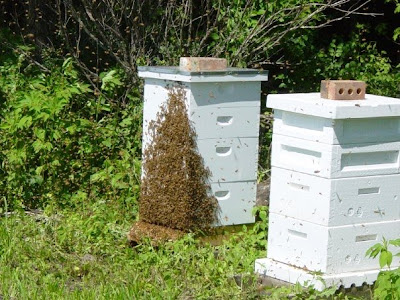
Last Tuesday I was out working with my bees, mainly seeing if their honey was getting ready to harvest. I was taking longer than I usually do and squatting down to straighten out one of the hives and I felt something on my ankle. I thought it was a stick or branch poking, but it happened again. As I got up it happened again and I walked away and pulled up my pant leg to find that there were quite a few bees on the side of my ankle. I brushed them away and went back to finish what I was doing and felt two more bites. I looked again and there were a few more on the front of my ankle. I brushed these away and closed up my hives and then went in to look at the damage.
Somewhere between six and ten bees stung my ankle and although it was a little painful and warm I kept about all the things I wanted to do. I was fine until the next day at work. After standing for about 4 hours my ankle started to balloon. It got so bad that blisters formed and started to pop. I really can't leave my job with out closing the store so I finally got a hold of my doctor who told called a prescription in. Within a few hours the swelling was getting better and by the next day was almost gone.
I considered taking a picture to post here, but it's pretty gross looking. All of this got me thinking more about what is in this venom that causes such a bad reaction. I have come to learn that their venom is made up of a variety of enzymes. These then begin to break down the tissues and cause massive inflammation. A true allergy to these stings is not common which is fortunate for me. I think many people have problems getting a similar sting in the neck or face and this same swelling causes the throat to close.
It just is facinating to think that that this terrible venom is made from flowers - nectar and pollen only. That's all they eat! What else could it be made from? While I was reading more about this on the internet - there is a whole school of medicine that uses bee venom to treat disease. Mainly that of inflammation - arthritis, joint problems, etc. A college profes
sor I had told me about this for the first time about 10 years ago. I don't think there are many doctors advocating taking a bee to sting a joint, but it seems that some how this venom is collected and then injected directly into the joint to be treated which someway helps to treat the pain.
Those little bees are amazing creatures. They work non-stop when they have food. When they don't they reduce their numbers so that they won't starve and even in climates as harsh as MN they are able to survive the winters without hibernating.
My doctor asked me if I was still going to keep bees. She has a son who keeps bees and has never had such a problem. I told her that I would just need to take a little extra care to protect myself. I am going to get a full bee suit for next year and try to protect my bees a little better. One of the reasons I think I got attacked like I did is partly due to the skunks who were having their way with my bees for a few weeks.
Skunks apparently like to eat bees and when they do this they really put a hive in defensive mode so they are much quicker to respond to any disruption. I am their helper - giving them a nice home to live in and feeding them if they happen to run out of food if it is a tough winter, but anyone that disturbes that hive is an enemy to them and they protect their home very efficently!
Just so you know - the picture of the bee hive at the top was taken after one of the hives swarmed. I didn't do that to them and wouldn't have went within 10 feet of that mess. I am so looking forward to the honey this fall, I tasted some of it after getting stung and it is very light and delicate. Much more flavor full than the clover honey you find in the stores.

2 comments:
This is so sweet! I'm sorry you had to get stung, but that it makes you only want to protect them better just warms my heart! You're such a good guy! I want to buy some of that honey, if you're selling it, btw... Is it true that if a bee stings you it dies? I hope not. :(
I will see how much honey I get, but I'll probably just want to give it away.
Yes honeybees do die when they sting. Some of the bee family doesn't though - wasps and hornets - for sure - they are able to sting multiple times.
This is the main reason why honeybees only sting if they are threatened.
Post a Comment